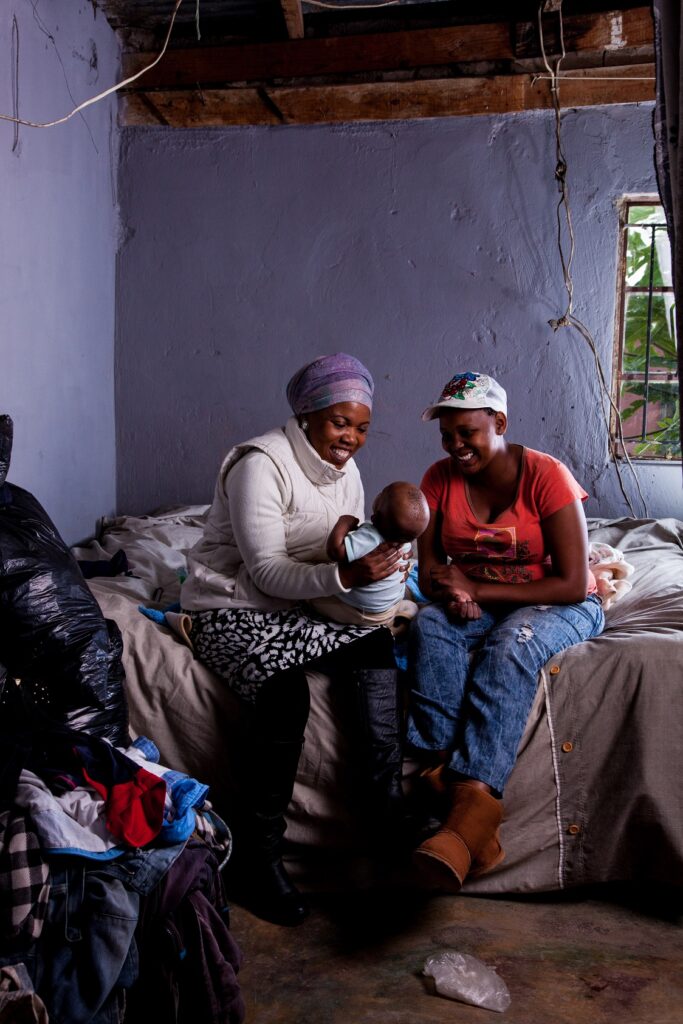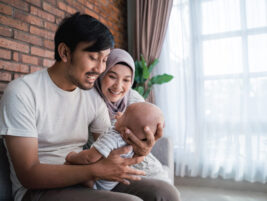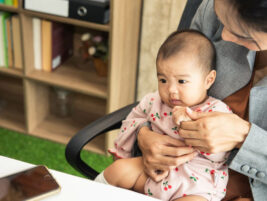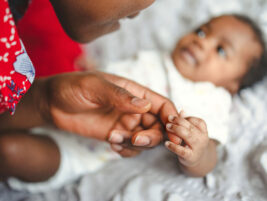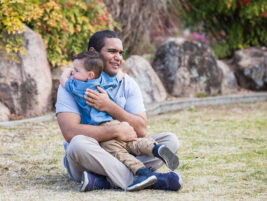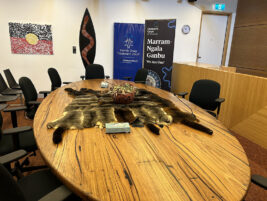Introduction
In this paper, we present five web posts that were written by students from Leiden University College in collaboration with Ububele Early Childhood Community Practitioners (ECCP), in Alexandra Township, South Africa. The web posts contain and capture the expertise and experiences of the ECCPs in communicating with families with infants and young children, in their community.
The Ububele Educational and Psychotherapy Trust (Ububele)
The Ububele Educational and Psychotherapy Trust (Ububele) in Alexandra Township Johannesburg has been implementing a Home Visiting Programme since 2012 (Frost et al., 2018). The fourteen-week manualized intervention aims to improve the responsiveness of caregivers (mainly mothers) living in chronic stressful conditions. Alexandra Township, a previously “black” designated area under South Africa’s Apartheid government, is an over-populated area on the outskirts of Johannesburg, and despite providing a vibrant home to many, is known for its dearth of supporting infrastructure and high levels of crime (Bain et al., 2017).
In designing the Home Visiting Programme, the developers attempted to integrate Western-developed psychological models of attachment theory with local indigenous knowledge, including the Nguni practice of Umdlezane (culturally sanctioned support for mothers of neonates).
The intervention is implemented by lay mental health counsellors, called Early Childhood Community Practitioners (ECCP), themselves women/mothers from Alexandra. ECCPs do not have further education and training, beyond school leaving certificates, but are trained in infant mental health service provision by Ububele and are salaried parastatal workers. The intervention is overseen by a team of psychologists working at Ububele and a programme manager with expertise in public health. ECCPs write case notes after each visit which provide rich, detailed, reflexive accounts of the challenges mothers of newborn infants face in a setting with unequal access to maternal health services.
Background to the web posts
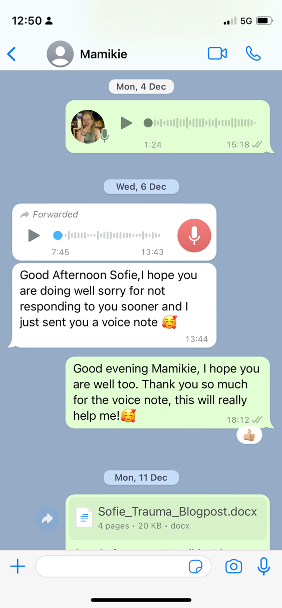
In 2022, Ububele and Leiden University College (LUC) initiated a collaboration to collectively, together with the ECCPs, analyse the home visit reports to better understand the context in which the home visiting intervention was implemented, and the challenges faced. The cross-disciplinary collaboration also hoped to give voice to the experiences of the ECCPs and provide an avenue for them to publish their expertise.
In 2023, two collaborations between the ECCPs and anthropology and global health students from two Universities, one South African and one Dutch, took place. The first, a pilot collaboration, took place between one student from LUC and the full cohort of ECCPs and focused on father involvement. This collaboration resulted in a web post that was published on the Ububele website and the local Alexandra newspaper.
The second collaboration took place between the ECCPs, four Global Public Health (BSc) and International Justice (BA) students from Leiden University College and fourteen MA students of the Department of Social Anthropology and Development Studies of the University of Johannesburg. This virtual collaboration focused on an analysis of what ECCPs considered precarity. That is, everyday life situations that are considered precarious and create daily experiences of persistent uncertainty.
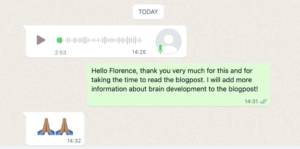
Collaboration Outputs: Web posts about motherhood in Alexandra
The web posts centred around five themes identified during the initial 2022 analysis, identified by the ECCPs. Namely,
- Post Partum Depression,
- Involved Fathers,
- Foreign Mothers,
- Trauma, and
- Living Conditions.


1. Post-Partum Depression
During the case note analysis, the theme of depression among mothers was prominent. The ECCPs and students agreed that post-partum depression would be a good theme for a web post, noting that it would also be useful for other practitioners or mothers in Alexandra township to know how ECCPs work with and notice post-partum depression. One of the techniques used is the monitoring of countertransference, whereby ECCPs use their feelings about a situation as a starting point for thinking about the emotional experience of the mother.
A web post Recognizing Post-Partum Depression: Being With Mom, by Marijne Kunst (LUC) with Florence Ramoshaba and Senzekile Khumalo (ECCPs)
Seeing me coming before even greetings she immediately said she was thinking about me. I asked her why. She looked away and said she was just thinking of me. Her eyes became teary and her voice faded for a moment. I tried to find her face but she went inside the house to fetch a chair for me. I stood outside for a while and she came holding a chair and a bucket. I [choose] to sit on a bucket while she sat on a chair. For a moment there was some quietness. I was not sure how to start this visit. So many questions on my mind and not knowing where to start. – Thandiwe Khumalo (ECCP).
Whether you are a first-time mother, a foreign mother (see our description of this term below), or just a mother living in Alexandra, we ECCPs from Ububele know that motherhood can be a challenge. As mothers ourselves we have been through the same challenges. Ububele’s home visiting program has been running since 2012. It includes four pregnancy visits and ten visits after birth, covering topics like your thoughts about your pregnancy, and understanding baby’s signals. Given how difficult parenting is, we tell mums ‘abazali abazamayo’: good parents are simply parents who keep on trying. Babies have thoughts and feelings and we help you understand this and respond properly. We are not there to judge you.
The most important part of our work is being there for mothers, really listening, and creating space for all emotions to exist. Sometimes mothers share difficult stories, for example, about abuse or losing a baby, and in these moments especially, it is so important to us to listen and be with you. We also ask questions like. “How do you think you can help yourself to deal with that?”. We think together about solutions.
Sometimes new mothers feel low after birth. This could be postpartum depression and it is crucial to receive help. Important signs that you might be depressed include not responding to your baby, or staying in your room all day. Sometimes we also see houses becoming dirty, and mom not noticing. When we see these signs, we know you are struggling and try to find you help. We can refer you to a psychologist. As ECCPs, we also use our own feelings to recognize when mothers are struggling. When we are feeling very overwhelmed and worried in a situation, that shows additional support may be needed.
Being an ECCP means being with a mother. Although it may seem like a small action, it can have a huge impact. Motherhood is not something you are ever meant to do alone, and as ECCPs, we make sure you do not have to.
2. Involved Fathers
While some Home Visiting Programmes focus on the mother, Ububele includes all primary caregivers. Fathers are often seen to be uninvolved in South Africa. The ECCPs and students analysed what father involvement looked like in practice. Quantitative data was analysed to understand how many mothers listed the father of the newborn as a supportive person.
The following web post reaches out to parents, both mothers and fathers in Alexandra township:
Abibaba Abazamayo: Trying fathers, by Mady Chen (LUC) and Thandiwe Khumalo, Lerato Khoza, Senzekile Khumalo, Florence Ramoshaba, Mamikie Rumo, Mariet Matlaila (ECCPs)
How can we best support involved fathers in raising their children? As ECCPs who work with families every day, we ask ourselves this question daily. In our visits, we see that many fathers are involved, and many more want to be involved. Between 2018 and 2023, we visited more than 1600 families, and 71% of the mothers told us that the baby’s father was present. These moms tell us that they feel supported, and we see the babies connecting with their fathers. We met some fathers who bond with their babies by talking or singing to them, playing with them, and soothing them when they cry. Some of the fathers we met were physically separated from their babies, so they spoke to their babies over the phone.
We also met fathers who assisted with house chores, like cooking food to reduce the burden on the mom and waking up at night to take care of the baby. In addition, when we explain the Ububele home visiting project to parents, we see more and more fathers reading over the forms to truly understand the purpose of the home visits. Some fathers can even answer more questions about the baby during our home visits than the mother. As ECCPs, we try to encourage fathers to participate like this in our visits, but we sometimes face difficulties. Fathers must juggle many tasks. They are often at work when we visit, but even when they are home, they sometimes leave the meeting because they believe that our work only involves women. This belief is not only held by fathers, as some mothers are also reluctant to introduce the father of their baby to us.
Sometimes, when the relationship between the father and mother is strained, it is difficult for us ECCPs to include both parents in the visit because the baby will also notice the tension and cry. In our visits, we have observed fathers who go for periods without talking to the mother, which makes it difficult for us if we want to involve them. We live in a community with different cultures and beliefs. The work that we are doing is hard, and how we were raised is completely different from the Western world. But as ECCPs, we see that the way we grow also shapes how we are as parents. Children whose fathers are more involved today will more often be present for their own children in the future. So, in your opinion, what can we do to support you as a father? Please leave us a message.
3. Foreign Mothers
In one of our collaborative projects, we asked ECCPs to select transcripts of moms that they were particularly worried about. They selected 17 mothers. The majority of these mothers were what Ububele calls foreign nationals or foreign mothers. This term is used to capture a diverse range of non-South African citizens living in South Africa in order to avoid the discrimination often associated with other terms which might emphasise the legality of the individual’s presence in the country.
The analysis showed that the ECCPs were concerned for these mothers due to the lack of access to social and health services, but also at times due to discrimination and hardship they faced. This inspired ECCPs to write a web post together:
Challenges faced by foreign mothers in Alex: prejudice and social support, by Fiona Marie Reich (LUC) with Thandiwe Khumalo (ECCP)
A mom tries to call an ambulance for her husband, but instead of help, she’s told to “go back home”. This is just one of the many examples we as ECCPs working for Ububele encounter when we visit foreign moms. Every day, we see the struggles of those born outside of South Africa. This has been a prevalent issue all around the world and in South Africa; even a rise in xenophobia has been recorded. Through our work in Alexandra, we have discovered that those who are foreign nationals within this community have faced many challenges.
We have visited many foreign mothers, but we do not count the numbers so that they do not feel prejudiced against. When speaking to foreign mothers who have found support and friendship in Alex, some tell us they found a second family in South Africa, a home away from home. We also talk to mothers who face challenges. Some foreign mothers with young infants face verbal insults from strangers, but also from their partners or in-laws, sometimes leading to loneliness.
Foreign mothers also often have a more limited support networks and rely on their partners and his family, for example, to issue grants and take care of health and education of their child. For the mom, this can be an additional source of stress, as she does not have any authority or control over matters that are of utmost relevance to the lives of her children. Even when moms are seeking support, they are often confronted with a language barrier or are scolded or sent away. Additionally, mothers do not always have a work permit or birth certificate for their children. Especially foreign mothers who came to South Africa illegally are often unable to access government help, such as a SASSA grant (the Social Relief of Distress Grant of the South African Social Security Agency). Access to education for their children and health care is more difficult and more expensive than it is for moms who are South African nationals.
This of course has consequences for infants and children, who may suffer illnesses without treatment or cannot attend basic primary education. Our task as ECCPs is to be with every mom, to simply sit with mothers or listen to their stories. We find that a smile or a short friendly conversation can have much impact on those foreign moms who feel excluded by their family or community or who have no one to support them. What can you do to contribute to the inclusion of foreign mothers? Let us know!
4. Trauma
When ECCPs find mothers to be at risk, there is often a situation of past or present trauma. This can be very broad. It can refer to trauma because of past life experiences, such as parents who died or committed suicide, or present trauma because of intimate partner violence or violence such as robberies or rape of the mother, or an older child. Trauma also comes from having lost pregnancies or children. The following web post tried to capture this.
The Impact of Trauma on the Journey of Motherhood, by Sofie Delansay (LUC) with Thandiwe Khumalo and Mamikie Rumo (ECCPs)
A few years ago, I visited a mom of four who started having problems with her former boyfriend when she got pregnant with someone new. He started verbally harassing her over the custody of their children, and I wondered how this would impact her unborn baby. She had looked disturbed when I shared my concern and asked what I meant. After I explained, she fell silent, which happened often when talking about the baby. Moments later, she said my concerns brought up difficult questions, after which I asked her what was difficult. She didn’t answer. – Thandiwe Khumalo (ECCP)
During our home visits from Ububele, we have seen how trauma experienced in the past and present can create challenges in motherhood. We want to help these mothers by providing support and by being with them through this journey. Many moms experienced trauma while growing up. Some of these traumatic events happened in their own homes, by the people closest to them, but often it was by strangers. For example, it also occurred that a mom was sexually assaulted when going to school. Many of these moms, however, still experience trauma, for example through persistent sexual or physical abuse. These events frequently happen in their own homes, by someone close to them.
Other forms of trauma do not relate to physical or verbal abuse. Examples include intense birth experiences, such as a miscarriage or maltreatment by nurses during labor, or the death of a loved one. We have seen that these moms often feel unsupported and stop caring, as they have a lot on their minds and often only think about how things ‘could have been’ if the situation had been different. This could lead to a loss of attention towards their baby and the process of raising them, which can harm the child’s development. Being exposed to constant emotional distress impacts a mom’s ability to form a secure attachment bond with her baby, which could have effects on a baby’s socio-emotional development. This is why maternal mental health is so important, both for the mother and her ability to take care of her child and for the child’s development.
All ECCPs have gone through the motions and challenges of motherhood. If a mom is struggling because of experiences of trauma, we can be there to listen and support her. Besides this, many moms have expressed that they want to ‘break the cycle’, not wanting their children to experience what they did or wanting to learn how to heal. For instance, one mom, who used to be beaten when doing something wrong decided she wanted to be a better parent, and would rather explain to her children why their behavior was wrong instead of beating them. Do you recognize this? Please reach out to us.
5. Living conditions
One of the themes identified by the ECCPs and students, that created challenges for mothers, was living conditions. The web post below details how certain living conditions can make life for mothers in Alexandra more precarious.
The Influence of Living Conditions on Motherhood, by Dolça Collado (LUC) with Lerato Khoza (ECCP).
I found the mother busy fetching water. She wanted to bathe the baby. The baby was naked and he got paraffin all over. I asked the mother what was going on. The mother said that there was a fight next door. The man was fighting with his girlfriend and he took paraffin and everything outside. So the mother did not see the paraffin. The baby was playing outside and he splashed the paraffin all over his body. So the mother was so worried thinking that maybe the baby had drunk the paraffin, but the baby was playing all right and the mother said she is sure the baby did not drink the paraffin. – Ububele ECCP
In our work as ECCPs from Ububele, we see how living conditions, safety concerns, food security and community problems make daily life difficult for the mothers we visit. Security is a very big concern. Mothers worry very much about leaving their children alone, but sometimes they have no other choice. Because of the violence in Alexandra, mothers and their children can’t be outside after 6 pm. Mothers are also very stressed about money for food. Many mothers struggle to afford groceries, even if they get the SASSA grant. Load shedding is also a big problem, as the power cuts cause food to spoil very quickly and make it hard to make a bottle for the baby.
As ECCPs, we visit many types of houses. Some people live in lovely houses, while others live in tiny shacks or unsafe abandoned warehouses. We often see how mothers attempt to improve the conditions in the house. But sometimes we see very dangerous situations for infants, such as electric fridges that shock, mould on the ceiling making breathing difficult, paraffin stove accidents or rat poison being left out near infants. Sometimes we see electric cables near rainwater, or shared toilets that are very dirty. We see lots of rats. Sometimes mothers are too worried about daily life to keep their baby away from these things. But many mothers are very worried about these things and do everything they can to try and keep their baby safe. This often means that they can’t let their baby play and explore in a way that would best help their development, because they must most importantly keep them safe and keep them alive. We try our best to think with the mothers about how to help their children develop well despite these challenges. We hope that the conditions of Alexandra can improve so that it is easier for mothers to support their children to develop.
Conclusion
This descriptive paper provides direct insight into the lived experience of mothers from Alexandra Township, through capturing the rich expertise of infant mental health lay practitioners (ECCPs). The web posts presented above, provide a rich description of the impact of trauma, harsh living conditions, and maternal mental health struggles for mothers living in Alexandra Township, particularly for foreign nationals. It also shows a more nuanced picture of father involvement in South Africa, otherwise documented as simply “absent”.
Most importantly the web posts emphasize the important care work of ECCPs. Collaborations such as this one, between intervention implementers and cross-disciplinary academics, allow for the valuable, rich expertise and perspectives of lay workers to be shared with families, practitioners, researchers, and decision-makers. This in turn, has the potential to allow for the improvement of culturally and contextually appropriate infant mental health service provision and the development of the infant mental health field.
References
Bain, K., Dawson, N., Esterhuizen, M., Frost, K., & Pininski, D. (2017). “Abazali Abazamayo” (Parents Who Keep on Trying): Mothers’ Responses to the Ububele Mother-Baby Home Visiting Programme. Early Child Development and Care, 187, 1, 13-34.
Crime Statistics South Africa (2019). Worst ten precincts: Largest number of reported crimes in Gauteng. Crime Statistics South Africa. Retrieved on 13 July 2019 from https://www.crimestatssa.com/toptenbyprovince.php?ShowProvince=Gauteng
Frost, K. Dawson, N., & Hamburger, T. (2018). The Ububele Home-Visiting Project: A preventative infant mental health intervention for Alexandra, South Africa. International Journal of Birth and Parent Education, 5, 3, 36-40.
Authors
de Klerk, Josien
the Netherlands
Dawson, Nicola
South Africa
Chen, Jo-Hsuan
United States of America
Reich, Fiona Marie
the Netherlands
Delansay, Sofie
the Netherlands
Kunst, Marijne
the Netherlands
Collado, Dolça
the Netherlands
Khumalo, Thandiwe
South Africa
Khoza, Lerato
South Africa
Khumalo, Senzekile
South Africa
Ramoshaba, Florence
South Africa
Rumo, Mamikie
South Africa
Matlaila, Mariet
South Africa


